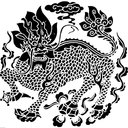The antitumor function of arctigenin in human retinoblastoma cells is mediated by jagged‑1.
Клучни зборови
Апстракт
Retinoblastoma is an intraocular malignant tumor that may severely affect vision and represents a life‑threatening disease in children. Arctigenin (ATG) is an active compound that exhibits numerous pharmacological activities, which is isolated from the seeds of greater burdock (Arctium lappa Linnaeus), a plant used in traditional Chinese herbal medicine. The present study aimed to investigate the effects of ATG on cancer progression by analyzing the retinoblastoma cell line Y79. ATG exhibited a significant inhibitory effect on the viability of Y79 cells in a dose‑dependent manner. Furthermore, treatment with ATG promoted apoptosis, and increased the protein expression levels of B‑cell lymphoma 2 (BCL‑2)‑associated X protein and decreased the protein expression levels of BCL‑2. Cell migration was suppressed following treatment with ATG, as assessed by Transwell migration assay. Furthermore, the protein expression levels of jagged‑1 (JAG1) were decreased, and various factors involved in the Notch signaling pathway, including the Notch intracellular domain (NICD), transcription factor HES (HES)5 and HES1 were downregulated following treatment with ATG. The decreased expression levels of JAG1 were restored in response to JAG1 overexpression, alongside increases in the protein expression levels of NICD, HES5 and HES1. Furthermore, overexpression of JAG1 partly restored the cell viability and migration suppressed following treatment with ATG. In addition, ATG‑induced apoptosis was reduced by JAG1 overexpression. Collectively, the present results suggested that ATG may serve as an antitumor compound by suppressing the proliferation and migration of retinoblastoma cells, inducing apoptosis, downregulating the protein expression levels of JAG1, and decreasing the activity of the Notch signaling pathway.


